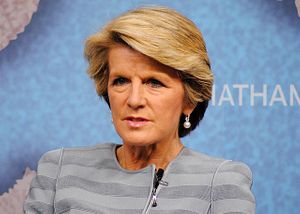The timing was perhaps unfortunate. Before departing on her first official trip to Myanmar as foreign minister, Julie Bishop declared her main focus would be supporting education, economic development and the empowerment of women. But within days an outburst of sectarian violence between Buddhists and Muslims in Mandalay, Myanmar’s second-largest city, had left two killed and fourteen injured, highlighting the fractious nature of the country’s hurried rush towards development. With a peace process that has proceeded in fits and starts, Myanmar remains a unique challenge for outsiders like Australia as they seek to engage and deepen their presence in the country.
Although formal diplomatic relations between the two countries date back to 1952, it is only since the emergence of a civilian government in 2011 that Australia has stepped up its bilateral engagement. In January 2013, Australia became the first Western nation to sign a Memorandum of Understanding on Development Cooperation with the Myanmar government. Australia’s development assistance has also increased dramatically from $48.8 billion in 2011-12 to $78.8 million in 2013-14, seeking to balance the competing needs for long-term development (education, health and rural development) and short-term security (peace building, humanitarian aid).
After meeting with a number of senior government figures, including President Thein Sein and Foreign Minister Wunna Maung Lwin, Bishop announced a total aid package of $24.6 million that leans much more heavily towards the latter. Australia is set to provide $9 million towards the peace process along with an additional $10 million for immediate humanitarian assistance to some of the country’s estimated 490,000 internally displaced persons. Support was also pledged for the Myanmar Peace Center, a government-initiated effort tasked with monitoring ceasefire negotiations, coordinating assistance in high-conflict areas, and facilitating peace negotiations.
As part of a much broader push for political reforms and economic growth, Australia will also provide $5 million through the World Bank to strengthen Burma’s management of public finances. This will be a key initiative for promoting greater transparency at the government level and ensuring public goods are distributed evenly across all of Myanmar’s various ethnic and social groups. In line with the high priority placed by the government on capacity-building, Bishop announced a separate $27.8 million commitment by the Australian government to boost services in 43,000 schools as well as train school managers and education officials.
These initiatives are all broadly in line with the major reform areas in which Myanmar needs to make sustained progress. But concerns remain over the government’s commitment to the democratic process after a parliamentary committee last month voted not to allow the constitutional change required for Aung San Suu Kyi, leader of the National League for Democracy (NLD), to be eligible for the presidency ahead of next year’s parliamentary elections. Whether Myanmar’s “flourishing, disciplined democracy,” as described in the 2008 Roadmap, will continue to deliver meaningful political reforms or backslide in favour of military control presents a significant challenge for Australia.
In an interview with The Australian ahead of the trip, Suu Kyi called for greater political pressure on Myanmar’s military leaders to move beyond what she called the “veneer” of democracy. She urged Australia to “wait to see how things emerge” on the issue of constitutional amendments given this directly affects a lot of the privileges the military have built up. On this point, the foreign minister was largely in agreement. After meeting with Suu Kyi, Bishop reiterated Australia’s support for a “free and fair election” in 2015. “We hope that any constitutional amendments promote a strong, inclusive democratic system in Myanmar,” she said, “and that’s a message that I have given to all the political leaders that I’ve met.”
On the issue of ethnic and sectarian tension, Bishop appears to walk a difficult tightrope quite convincingly. In her meeting with Sein, she raised Australia’s concerns about the human rights situation, specifically focusing on the government’s commitment to implement an action plan in Rakhine state, which has been greatly affected by inter-communal violence. The foreign minister also made an effort to meet directly with local representatives of the Rohingya community as well as other ethnic political parties participating in next year’s election. It is hoped that a lot of the humanitarian assistance and support for education provided by the Australian government will also help support the country’s most-affected ethnic groups.
Australia still maintains a number of sanctions on the government in Myanmar relating to military activity. Moreover, as an increasingly significant provider of bilateral aid, leverage exists for Canberra to use in the event that things take a turn for the worse. With Myanmar set to host the East Asia Summit in November and parliamentary elections expected to take place in 2015, it will be crucial to maintain strong pressure if Australia’s aid package is going to play a constructive role in Myanmar’s development.
































